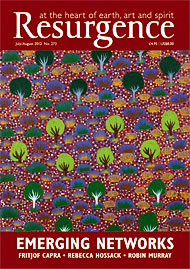Rabindranath Tagore’s short play The Post Office, performed afresh in London last year by The Live Literature Company, is a work of extraordinary depth. The simple language of the play works almost poetically, delivering an allegorical story that ends with the opening of the gate from the material world to the realm beyond. It is a play with an Eastern sensibility and at the same time a universal appeal.
The story is told through Amal, an orphaned boy who from his sickbed encounters a procession of characters from various social positions and with various human qualities. The characters illustrate the opposing forces tugging at Amal: restriction and freedom, caution and courage, kindness and unkindness. The curd-seller offers him a pot of curds without wanting any money: “Just eat some of my curds, and I’ll be happy.” The fakir, who can go anywhere, tells Amal that he will be able to travel over seas, mountains and forests. The village headman is sardonic and sarcastic.
The play is not entirely tragic. There are comic touches: for example, the royal physician, on arrival, immediately orders the opening of all doors and windows, unaware of the local doctor’s strictures on the danger of fresh air. Amal has been told earlier that the local doctor knows everything because he has read books (Amal has read none); and the doctor operates on the principle, “The greater the suffering the better the result.” Amal wins our admiration. He freely engages with everyone – “I love strangers!” – much to the consternation of his too-protective uncle.
Amal shows a resilient curiosity throughout the final stages of his illness and pins his hope on the promise of a letter from the king, a hope rewarded by the further promise that the king himself will come. Amal is happy looking out from his window to the new post office, its golden flag flying, where his letter will arrive; he is captivated by the thought of the letter and the post office and imagines that he himself will become a royal postman one day. The final words are spoken by the flower-girl Sudha, love personified, whose anklets jingle as she walks along.
As Amal’s spirit is lifted, so the play lifts ours. Its enduring appeal has resulted in many translations from the original Bengali into European languages, including the latest English translation by William Radice. The performances over the years include one in Polish performed by Jewish children in the Warsaw ghetto in 1942; when asked why he had chosen the play, Janusz Korczak said that eventually “one had to learn to accept serenely the angel of death”. Of Tagore’s work generally, we recognise with Marguerite Yourcenar that it represents a “transcendent idealism”. And, as W.B. Yeats said, Tagore exists in a tradition “where poetry and religion are the same thing”.
The performance of the play in London last year, 100 years after its creation, was imaginatively directed by Valerie Doulton, who deployed not only a talented cast but also music and shadow puppetry. Amal was played with remarkable aplomb by Jyoti Goel, assisted by Amerjit Deu, Noah Brooks and the entire troupe.
William Radice brings a fine clarity to his translation of the play, capturing the magic of Tagore’s original writing.
The Post Office was performed at The Nehru Centre, London in May 2011, followed by performances at The British Library. www.theliveliteraturecompany.co.uk







